In March of 2005, Harry Stonecipher was unjustly forced to resign from his job as the CEO of the Boeing Company. The then 69 year old executive admitted, with unprecedented integrity, that he was engaged in a consensual affair with a co-worker. The problem is, should Mr. Stonecipher have been forced to resign? By carefully examination of the utilitarian and deontological issues of the case, it will be blatantly obvious that Mr. Stonecipher was unfairly asked to step down from his position.
Certainly Harry was spot on when he determined having an affair would bring the greatest happiness. In a society where 14% of people think adultery is acceptable behavior and it is constantly glamorized by movies and television, how could he even imagine the act would cause anyone unhappiness? Mr. Stonecipher had been separated from his wife for some time so it's likely that news of the affair was no surprise to her.
On the other hand, there's little doubt that Harry and the unnamed executive he was involved with experienced great happiness in their relationship. From a Utilitarian perspective, Mr. Stonecipher made the best decision by having an affair.
As far as rights are concerned, Mr. Stonecipher's rights were not violated by being asked to resign. However, depending on the method that was used to obtain the correspondence that unveiled the affair, his right to privacy might have been compromised. Having an affair is does not violate Boeing's Code of Conduct , the allegations should have never come to light. Clearly someone on the board of directors had a vendetta against Mr. Stonecipher. The anonymous "whistle-blower" whom came forward with the purported evidence of the affair was likely a fabrication of a saboteur that reveled in the though of taking down Harry with the very...


